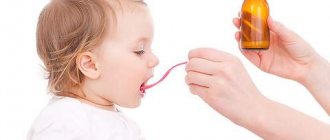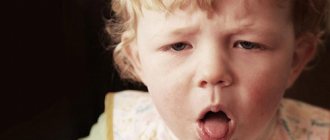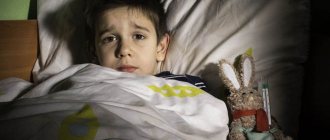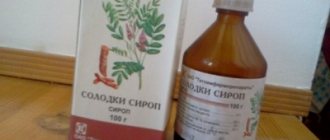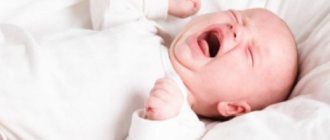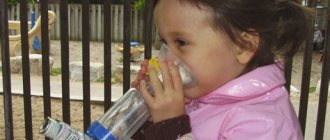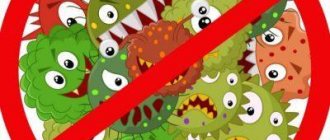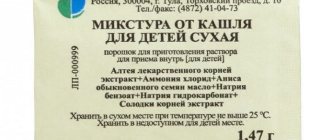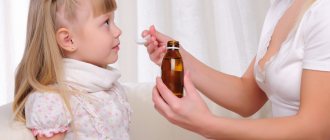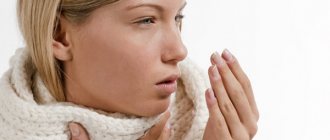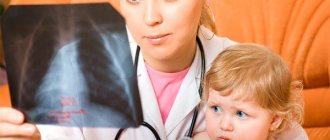Effective cough remedies for children from 1 year of age
Types and principles of action of cough medicines
Medicines for the treatment of cough in children are available in several dosage forms:
- 1. Tablets - contain a higher concentration of the active substance than in syrups and drops. Therefore, they are recommended for children aged six years and older.
- 2. Syrups - have a sweet taste, children take it with pleasure. The safest form for a small child.
- 3. Drops are an alternative to tablets and syrups. Plant-based drops are most often used.
- 4. Ointments - warm up, helping the body fight colds
All children's medications for this disease can be divided into 2 groups:
- having an expectorant effect.
- helping to suppress the cough reflex.
Drugs from the first group are more preferable for use, because they help thin sputum and make coughing easier.
Medicines from the second group are rarely prescribed to children, since they do not fight the causes of the disease, but only suppress it. The principle of action of such drugs is to influence the center in the brain responsible for the cough reflex. Thus, signals from the bronchi are blocked - coughing does not occur. These drugs often contain codeine. The use of medications with this component is contraindicated for children. Since in this case the disease itself is not treated, and the sputum remains in the bronchi, this is a direct path to bronchitis or pneumonia.
The exception is a situation where the child has been suffering from prolonged frequent coughing attacks for a long time. But it is necessary to use medications that suppress the cough reflex only on the recommendation of a pediatrician.
Features of choosing a medicine for a child over 1 year old
When choosing a medicine, first of all it is necessary to determine what type of cough the child has: dry or wet. Each of them has its own causes and methods of treatment.
With a dry cough, there is hardness of breathing, swelling of the pharynx and airways. Sputum does not come away due to its viscosity and stringiness.
Wet is characterized by good discharge of bronchial secretions, most often this is facilitated by the use of expectorants and plenty of warm drinks.
For children aged one year and more, it is preferable to use syrups, since the active ingredients are contained in gentle concentrations.
Taking any drug to remove phlegm should be accompanied by plenty of warm drink.
Syrups for wet cough
The most popular medications to ease sputum discharge during a wet cough:
Drops are another type of medication whose action is aimed at removing phlegm. Suitable for children:
Tablets can be used to combat cough. There are a number of quite effective means:
Warming ointments
To combat cough, ointments can be used as part of complex therapy. They are applied to the baby's chest, warming and making breathing easier. These remedies are also good for treating a runny nose.
Treatment with ointments can be carried out only if the child does not have a fever.
Folk remedies for treatment
If pharmaceutical drugs do not show the expected effect, a folk remedy can be given to the child to treat a cough. Among the most famous recipes:
- 1. Carrot smoothie. To prepare it, take freshly squeezed carrot juice and sugar syrup in a 1:2 ratio, place the components in a jar with a tight-fitting lid and mix thoroughly. The resulting product is stored in the refrigerator. This folk remedy should be given to the baby 1 teaspoon 4 times a day.
- 2. Honey-glycerin medicine. To prepare it, you need to mix 1 glass of honey, the juice of 2 lemons and a 5 ml bottle of glycerin. It is recommended to take this remedy 7 times a day: before and after each meal and at night. It is recommended to shake the drug before each use.
- 3. Milk-egg shake. You need to take 1 glass of hot milk and add 1 tbsp to it. l.butter and honey. All ingredients should be mixed and a well-beaten egg yolk and soda should be added at the tip of a knife. This cocktail should be taken 3 times a day until complete recovery.
Conclusion
For faster treatment of the disease, parents should not only give medications to their children, but also provide conditions conducive to recovery. Namely: humidify the air, maintain a cool temperature in the child’s room and give him plenty of warm tea or milk.
If, despite the use of medication, the cough does not go away, this may indicate a more serious diagnosis. To exclude this possibility, at the first symptoms of cough in a child, you should contact your pediatrician.
Preparations for the treatment of dry cough
An unproductive cough does not help cleanse the respiratory system. For a speedy recovery, it must be made productive. For dry coughs, you can find many drugs in pharmacies that dilute viscous sputum, which allows it to easily leave the child’s body.
Codeine, Codipront
A narcotic antitussive drug that affects the cough center in the brain. This codeine-based medicine is strictly prohibited for the treatment of children under two years of age. Prescribed in emergency situations and taken under medical supervision.
Sinekod
It is used to treat babies starting from two months of age. The drug includes the main component butamirate and is not a narcotic. This medicine acts at the level of the central nervous system and is good for coughing during whooping cough or parawhooping cough in a child.
For wet cough
If your baby’s cough has become productive, the doctor will recommend mucolytics and expectorants, for example:
- Mukaltin. The main substance of such tablets is an extract from marshmallow, which is supplemented with sodium bicarbonate. The drug has an expectorant, enveloping and anti-inflammatory effect. It is prescribed from the age of 3, while for young children it is crushed into powder and then mixed with water.
- Thermopsol. A product containing thermopsis herb and sodium bicarbonate. Reflexively affects the bronchi, stimulating the production of sputum and its expectoration. The dosage for different ages is selected by the doctor.
- Ambroxol. This drug has a mucolytic effect. The tablet form is prescribed to children from 12 years of age.
- Bromhexine. This medicine has both an expectorant and mucolytic effect. Appointed from 3 years of age.
- Lazolvan, Ambrobene and Flavamed. These drugs contain ambroxol, so the drugs are classified as mucolytics. Such tablets are prescribed from the age of 12.
- Ascoril. A combined drug with bronchodilator, mucolytic and expectorant effects. Appointed from 6 years of age.
- Pectusin. This drug is based on eucalyptus oil and menthol, so this medicine has a distracting, antitussive and anti-inflammatory effect. Children are prescribed from 7 years of age.
How to treat a cough in a 6-year-old child: medications
Medicines are prescribed depending on the type of cough and its cause.
During dry attacks, it is very important to transform the cough into a productive one - wet. For this purpose, drugs are used that help to achieve this.
In addition, for severe attacks, antitussives are used to relieve attacks. For wet cough, mucolytics and expectorants are prescribed. The main goal here is to liquefy and remove phlegm.
Here are the types of medications that are used in treatment:
- Antitussives. Such drugs relieve severe attacks (Bronchicum, Sedotussin).
- Mucolytics thin the mucus. Lazolvan or Ambrobene may be prescribed.
- Expectorants speed up the process of mucus removal (Pertussin, Mucaltin).
Bronchicum S is an antitussive herbal medicine. It has an antibacterial effect and also relieves spasms during attacks. Available in the form of syrup and lozenges. The syrup can be used by children from 6 months, and lozenges are allowed for children 6 years old. You should take 1 lozenge several times a day (no special instructions). Rash and hives may occur when using the medicine. It is not recommended for use if you are hypersensitive to the components.
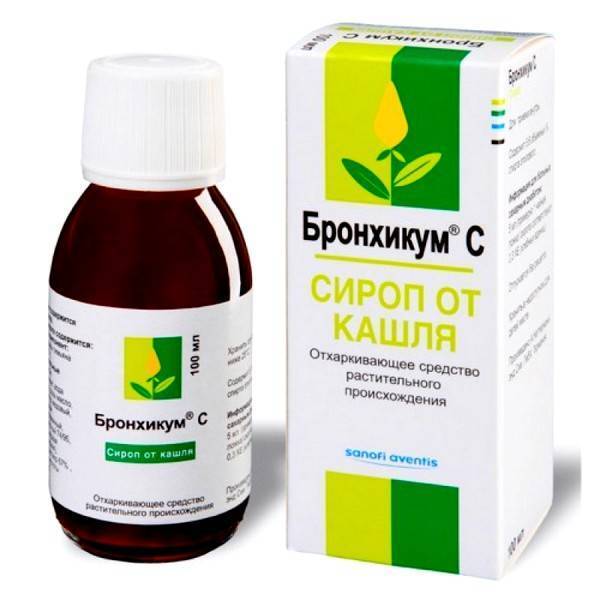
Sedotussin – has a weak anesthetic effect. The product can be used from 4 months for attacks of dry cough. Children 6-10 years old can drink 10 ml 3 times a day; at other ages the dose will be different. Side effects - nausea, dry mouth. You should not take this medicine if you have bronchial asthma or a wet cough.
Lazolvan is produced in syrup. The product helps with coughs with very thick mucus that is difficult to separate. Children 6-12 years old can drink 5 ml several times a day; at a younger age, the doses will be smaller. When taken, abdominal pain and skin itching are possible. The only contraindications are hypersensitivity to the product.
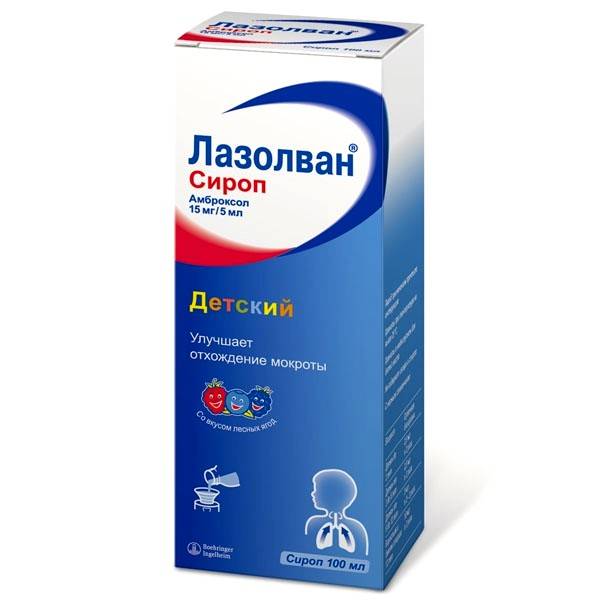
Ambrobene - the drug helps mucus become less thick, used for acute and chronic diseases of the respiratory tract. The medicine comes in the form of tablets and syrup. Tablets can be used from 6 years of age - ½ tablet 2 times a day. As for the syrup, at the age of 6 years you can take 2 ml a couple of times a day. Nausea and vomiting may occur when taking the medicine. Do not use this product if you have kidney problems.
Pertussin is a syrup. An expectorant is used for wet coughs. Children aged 6-12 years can take 1-2 tsp. several times a day. Treatment usually lasts 2 weeks. Heartburn and allergies may occur.
Mucaltin is used to relieve attacks of wet cough. This is a herbal preparation. It can be used 1 tablet 3 times a day for children 3 years of age and older. Side effects include mild nausea and mild allergies. There are almost no contraindications, but the product is not recommended for children under one year of age.
There are other medications that help with coughing attacks. The attending physician will decide on the prescription of certain drugs and a specific dose. You must follow the instructions strictly, as you can get the opposite effect.
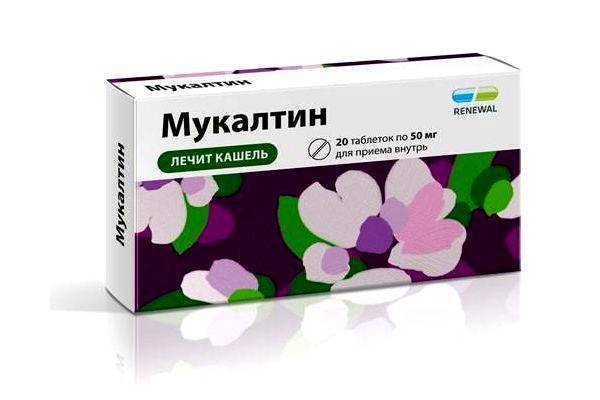
Basic information
Dry cough syrup is available in plastic bottles, the proportion of powder in which is about 20 g, and paper bags, packaged in 5 or 10 pieces.
The mass of each of them is 1.47 g. Its main components are extracts:
- marshmallow root - 4 g;
- licorice - 1 g;
- anise seeds - 0.05 g.
In addition, it contains:
- sodium salt of benzoic acid;
- sucrose - 10 g.
The drug can be used to treat infants over six months of age if the symptom is accompanied by thick and viscous sputum. If necessary, you can add sodium bicarbonate (baking soda) to the cough syrup. By reacting with the active components, the substance begins to alkalize the mucus, due to which the viscosity of the sputum is significantly reduced. The drug should not be taken:
- diabetics;
- for allergy sufferers;
- children with individual intolerance to certain components;
- patients with glomerulonephritis and pyelonephritis.
The average cost of the drug does not exceed 15 rubles, and therefore it is a very popular remedy.
The dry mixture is diluted with warm boiled or distilled water, after which it acquires a brown tint and begins to smell like anise. Instructions for use depending on packaging are as follows:
| Form | Application |
| In bags | Contains a sufficient amount of powder for one-time preparation of a mixture for a child over 12 years of age. For young children, the dosage is selected by the doctor individually. It is necessary to pour the contents of the sachet into a glass, dilute it with 1 tbsp. l. water and stir thoroughly. |
| In a bottle | Add warm water to the special mark on the bottle, then shake the mixture and take. |
The finished mass is stored in the refrigerator for no more than 2 days, after which it loses its medicinal properties.
Why are there so many cough suppressants?
When the respiratory organs are damaged by pathogenic and other agents, the latter actively produce sputum. This causes the person to start coughing actively. The symptom also occurs when the volume of mucus in the respiratory system is reduced. In this case, the patient coughs due to irritation of the bronchial mucosa.
Medications have different effects. The effect depends on the list of medicinal substances. Dry cough tablets suppress the body's reflex response. This reduces the load on the respiratory system. If an adult has a wet cough, the patient needs to take medications that remove mucus. It must be taken into account that as the pathology progresses, the dry cough becomes wet. When this happens, it is necessary to adjust the treatment regimen and use other tablets that help remove mucus.
Principles of cough treatment in one-year-old children
In a child under 1 year of age, cough begins under the influence of pathogens or mechanical factors. They irritate receptors either inside the respiratory tract or outside the respiratory system. Therefore, pediatricians recommend conducting a comprehensive examination of the child at the first signs of illness, and not skipping scheduled examinations by a pediatric cardiologist, gastroenterologist, ENT specialist, and other doctors.
What methods can be used to cure cough in children under 1 year of age:
| Main types of cough | Principles of treatment depending on the nature of the cough |
| Main differences between treatments | General treatments |
| Dry | Antitussives are prescribed to suppress cough. Inflammation is relieved with NSAIDs or glucocorticosteroids. Remove the foreign body from the respiratory tract. |
Treat the cause of cough with etiological medications with antiviral, antibacterial, antifungal, and antihistamine properties.
Wet Sputum is thinned with mucolytics.
The removal of secretions is accelerated by expectorants.
Drainage massage and warming accelerate the cleansing of the respiratory tract from secretions, and the lungs from infiltrate
Choking To increase the lumen of the bronchus, bronchodilators are prescribed (they do not treat either the cough itself or its cause).
To thin sputum and accelerate its removal, drugs with mucolytic and expectorant effects are used.
Massage and breathing exercises accelerate the cleansing of organs.
Allergic Gargling.
Rinsing the nose from mucus and allergens, particles of polluted air.
The child may be treated with antiparasitic and/or antihistamine medication.
Elimination of the provoking factor (replacement of medication, frequent wet cleaning, other measures)
Coughing A set of therapy methods is prescribed to treat the identified disease or eliminate a foreign body
General list of medications
The domestic market offers the following products that have an antitussive effect:
The indication for the use of these tablets is considered to be a hysterical and dry cough.
The following drugs have a mucolytic effect:
- "Lazolvan";
- "Ambrobene";
- "Mukobron";
- "Fluimucil";
- "Ambrolan."
Mucolytic drugs eliminate prolonged attacks when the intensity of the symptom reaches its maximum values. For expectoration of sputum, the following are recommended:
This list is constantly updated. You can determine what should be taken in a particular case from the packaging or from the instructions.
The best cough medicines
The best cough medicine is different for everyone, because the human body, which is not fully understood, sometimes reacts differently to taking certain medications. That is why many people have their own good and effective remedy to help cope with this symptom. The list of the best cough remedies below is compiled based on reviews of people who recommend them for use
Please note that before using them you should consult your doctor for an accurate diagnosis.
Effective cough medicine "Doctor Mom"
This good cough medicine will help an adult if this symptom is productive. The best remedy "Doctor MOM" includes ginger, elecampane, licorice root, plantain and basil extract and other plant substances that have a beneficial effect on the respiratory tract. This best and most effective cough remedy comes in the form of syrup and lozenges. Both of these types are equally useful and effective. However, unlike syrup, lozenges also help soften severe attacks, and they are also convenient to carry with you.
The best cough medicines, sprays and lozenges "Tantum Verde"
The best proven product, Tantum Verde, contains benzydamine hydrochloride and excipients. The pleasant-tasting mint composition has a gentle effect on the mucous membranes and alleviates dry, non-productive symptoms. It can even be used to treat small children by sprinkling a small amount onto a pacifier. On sale you can find “Tantum Verde” in lozenges and in the form of a spray with a convenient dispenser.
The most effective cough medicine "ACC"
This medicine has a chemical composition just like the previous one. It is believed that “ACC” is the best medicine for wet cough. Its effect becomes noticeable already on the first day of administration. The best phlegm remover thins it, making the painful and debilitating symptom more productive. This drug is available for sale in effervescent tablets and small sachets with powder.
The best medicine for dry cough "Sinekod"
With tracheitis, pharyngitis and tonsillitis, the symptom is dry, since mucus is practically not produced and does not stagnate in the bronchi and lungs. The drug "Sinekod" is considered the best among other means aimed at combating such ailments. It has an antitussive effect, which greatly facilitates breathing and reduces attacks.
The best medicine for a wet cough is “Ambroxol”
Ambroxol is considered one of the best and most effective drugs aimed at thinning mucus and removing it from the lungs and bronchi. The substances included in its composition have a gentle effect on bronchial peristalsis and cough receptors. This best product is sold in the form of syrup. Ambroxol is the cheapest syrup. “Ambrobene” and “Lazolvan” are also produced on its basis. They also include excipients and flavorings, but are much more expensive.
The most effective medicine for dry cough “Libexin”
"Libexin" along with "Sinekod" is considered the most effective cough medicine. The substances included in its composition also suppress the cough reflex, but do not have a depressing effect on the general respiratory center. It is supplied for sale in tablets, which begin to act effectively within half an hour after the first use.
Remembers that this symptom is not always associated with inflammatory processes occurring in the upper or lower respiratory tract. Often it develops for completely different reasons. In this case, even the best medicines may be powerless.
pro-kashel.ru>
Other articles
- Effective cough syrup for children
- Cough tablets reviews for children
- Traditional cough recipes for children
- Cough syrup for children 3 years old
- Herbal cough syrup for children
- Inhalation for cough with nebulizer recipes for children
- Cough antibiotic for children 2 years old
- Cough inhalations for children
- Doctor mom cough medicine for children
- Turpentine cough ointment for children
- Cough rub ointment for children
- Medicine for inhalation for cough with nebulizer
Radish remedy for babies from 1 year
For children over 1 year old, you can prepare more complex medications that actively affect coughing attacks. As with infants, it is better for parents not to be careless about the illness of their beloved child - a visit to the doctor in such cases is necessary.
The best remedy for this age can be prepared from radish and honey. The only thing you need to make sure in advance is whether the baby has a negative reaction to bee products. This is easy to do - give your baby a few drops of honey and check for side effects. If everything is in order, you can begin to influence the disease.
Preparation:
- Peel and chop one or two radishes into cubes or bars.
- Place the prepared raw materials in a small mold, pour in honey, stir the mass so that it is evenly covered with the bee product.
- Send the composition to simmer in the oven, do not turn on the high temperature.
After 2 hours, remove the pan from the oven, strain out the liquid - it will be used in treatment. After cooling, you can start taking it. Give a child only 15 ml of the composition; it is not recommended to exceed this amount of medication. The duration of treatment is a week, this is enough to completely get rid of coughing attacks.
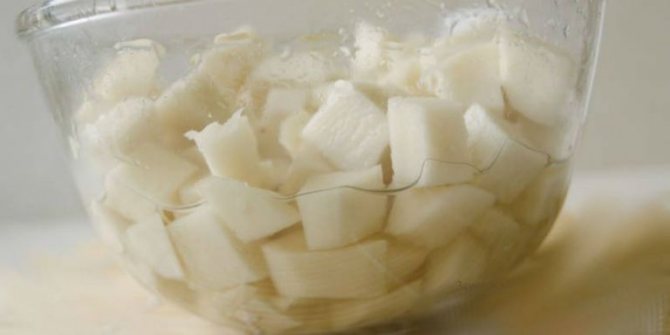
Prevention of cough in children
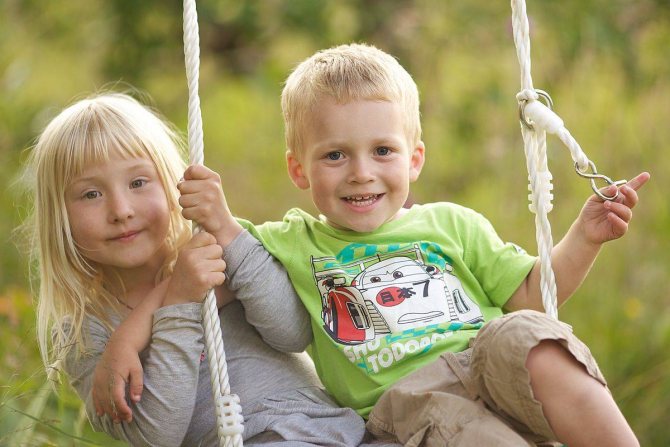
Parents need to pay attention to measures aimed at preventing the occurrence of cough. Considering the various reasons for its appearance, there are many directions
Among them, primary and secondary prevention are distinguished.
Timely vaccination against specific infections according to the vaccination calendar
This is especially important during the first year of life. Vaccinations against tuberculosis and whooping cough are carried out
At a later age, especially in preschool or schoolchildren, an annual flu vaccination is given. Preventing contact with infectious agents. To do this, the child should be isolated from sick family members or avoid being in crowded places. This is especially important during epidemic outbreaks. For older children, when attending school, it is recommended to use a cotton-gauze bandage, which is a barrier to their penetration into the body. Providing the child with a nutritious diet that contains sufficient nutrients. This applies to the consumption of vitamins and minerals necessary for the normal functioning of the immune system. In addition, the child's body must be fully provided with protein of animal or plant origin, as well as fatty acids. Carry out activities that will be aimed at strengthening immune forces. These are hardening procedures, such as swimming, air baths, and playing sports. For young children, it is recommended to regularly perform gymnastics, which prevents the development of congestion in the lungs. This group includes massage.
When a cough occurs, procedures are carried out that help prevent the development of complications. These include:
- Timely contact a specialist who will carry out all the necessary diagnostic measures and also determine treatment tactics.
- Regularly assess the dynamics of the disease. If there are no positive results, it is recommended to change treatment.
- Supplement therapy with traditional methods of treatment.
Treatment of cough in a child is carried out under strict medical supervision. You cannot self-medicate. At the first symptoms of cough, it is necessary to contact a medical institution for help. This is due to the fact that delay or the wrong choice of remedy can pose a threat to life.
source
What to do if a child’s cough does not go away?
Every adult has encountered the problem of dry cough in a child. Moms and dads are very worried about this symptom, and it causes a lot of inconvenience for children. Parents really want to help, but their actions must be meaningful and competent. If a painful symptom persists for a long time, it is advisable to seek the help of a specialist. A prompt call to the pediatrician will be needed if the baby is under one year old. Self-treatment should be accompanied by measures recommended by doctors:
- plenty of warm drinks - herbal teas, vitamin fruit drinks, still mineral water;
- maintaining optimal temperature in the room - no more than 20-22 ° C, regular ventilation, wet cleaning;
- rinsing the nose in the morning and evening in the presence of mucous nasal secretions with saline solution or a special nasal spray;
- long water procedures - frequent bathing of the baby in the bath;
- moderate physical activity – there is no need to force the child to adhere to strict bed rest.
Additionally, if necessary, the doctor prescribes percussion massage. Massage treatments that improve blood circulation can be easily performed at home. Mechanical action on the chest area helps get rid of mucus that babies cannot cough up on their own.
If a child coughs for a long time and severely, a thorough examination should be prescribed, which will identify the cause and allow additional therapy to be prescribed. It is under no circumstances recommended to use antibiotics without a prescription or try unverified folk recipes. A prolonged cough (for three weeks) often develops into pneumonia or bronchitis. The choice of the best cough remedy should be made carefully, guided by medical prescriptions.
Causes
The most common provocateurs of cough in children are:
- viruses;
- bacteria;
- allergens;
- poor quality air.
The most common causes of cough in children are infectious diseases and allergies (about 92% of all cases). Of this number, approximately 90% are due to infections, and only 10% are due to an allergic reaction. The champion among infectious diseases that provoke cough is ARVI.
A chest cough is never the only symptom of the disease. And just by the nature of a child’s cough, it is very difficult to determine what exactly triggered it: an infectious disease, an allergy, or dry, stale air in the apartment. This should be determined by an experienced physician, who in such situations analyzes a number of factors and symptoms, and not just the cough.
In addition to allergies or infections, cough can also be triggered by external factors, for example, bad indoor air. Sometimes, in order for the baby to start coughing, it is enough to simply not ventilate the children's room for several days and place a heating device near the child's crib. Dry air causes the lungs to produce additional mucus, which the body will reflexively try to get rid of by coughing.
If a child cannot cough up all the mucus accumulated in the lungs, then viruses will settle there. In this case, a common cold can turn into prolonged bronchitis or pneumonia. How to treat bronchitis and cough in an adult is described in this material.
Features of cough treatment in children
The cause of an unpleasant cough can be a common cold while walking or even when ventilating the room. Symptoms include dry mouth, raw mucous membranes, and soreness. There is no fever during illness, so cough medicine for children only eliminates the symptoms themselves. It is forbidden to use those drugs that block the source of cough, because they have a narcotic effect. Depending on the severity of the disease and its varieties, certain medications are used.
Dry cough
It is known that coughing attacks without sputum production are called the dry course of the disease, in which symptoms of tickling and vomiting appear. The attack can be barking, severe, not due to a cold, but due to physiology, when the baby tries to clear the bronchi of foreign bodies. This course is characterized by moments when the child cannot calm down, so medicine for dry cough for children is designed to relieve irritation from the mucous membrane.
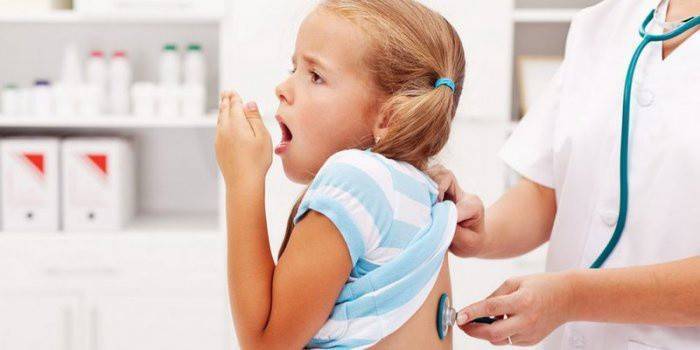
Wet
When the dry type of disease turns into inflammation of the bronchi, it becomes wet and requires other treatment. Symptoms include sputum production, chest type of disease, and pain in the lungs. A medicine for wet cough for children is designed to reduce the viscosity of sputum, improve its removal from the bronchi, helping to clear mucus. In this type, the use of drugs that suppress the centers of attacks is contraindicated, because stagnation of sputum can cause serious complications.
Allergic
A dry paroxysmal cough can be allergic when foreign bodies enter the children's body, causing immune rejection. This could be plant pollen, pet dander, or dust particles. Symptoms include a red throat and no fever. Treatment requires the use of antihistamines, which facilitate the body's transfer of allergens and reduce their harmful effects. To relieve bronchospasm, which invariably accompanies allergies, special complex remedies are used.
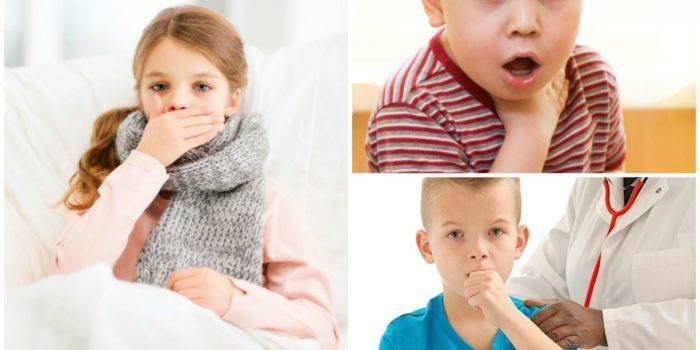
Why does he appear?
The main reasons for the body’s protective reaction under consideration include the following conditions:
- Respiratory diseases of the upper and lower respiratory tract, in particular ARVI, influenza.
- Diseases caused by bacterial pathogenic microflora, namely streptococci, staphylococci, meningococci and others.
- Development of an allergic reaction. The body often reacts negatively to irritants such as plant pollen, pet hair, dust, smoke, and so on entering the respiratory tract. When an allergy develops, as a rule, the child develops a dry barking cough. It can appear both in children 1-2 months old and in adolescents.
- Often the cough reflex indicates that a foreign body has entered the respiratory tract. This can happen while eating, if the baby, for example, chokes, or if small parts of toys and other objects get into the bronchi.
- A cough that persists for a long time may indicate the formation of a tumor that is putting pressure on the upper or lower respiratory tract.
It is important to understand that the last two points refer to a very serious and dangerous condition. Children should never be left unattended while eating or in a room where there are small objects, such as small toys, coins, buttons, clothespins, etc. If parents observe a prolonged barking cough in their child, but there are no other symptoms, it is necessary to visit a doctor to rule out the development of a neoplasm. A dry, persistent cough may indicate the development of an allergy. In this case, it is very important to determine the type of allergen and exclude the patient’s contact with it. Otherwise, any treatment will not be effective.
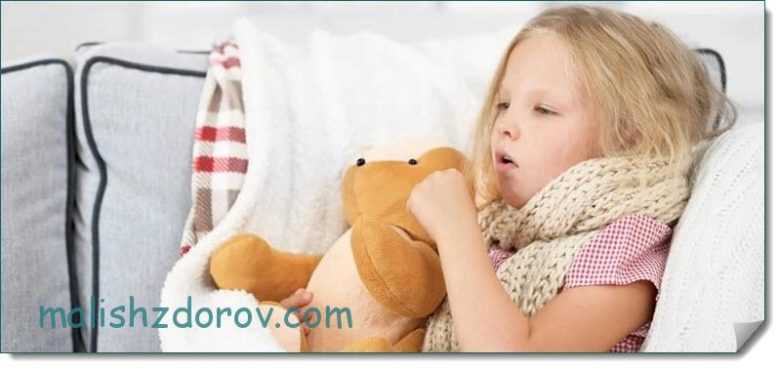
Treatment of cough in children under 3 years of age should be carried out under the close supervision of a doctor. This is due to the fact that at this age, attacks are often accompanied by bronchospasm, which is very dangerous for the child’s life. In children after 3-5 years of age, laryngeal spasm occurs less frequently.
